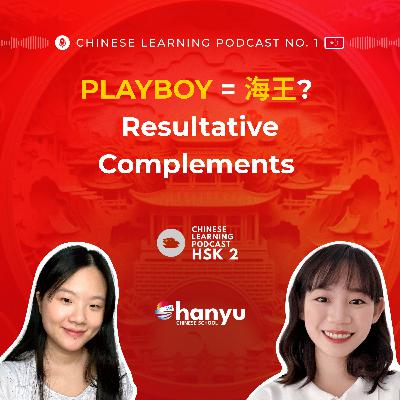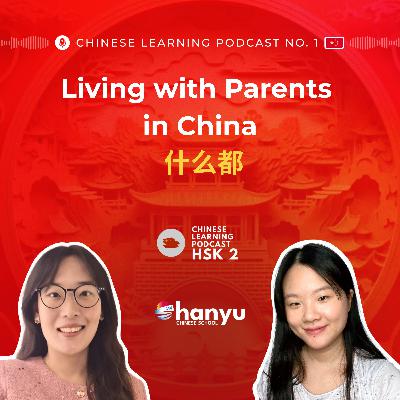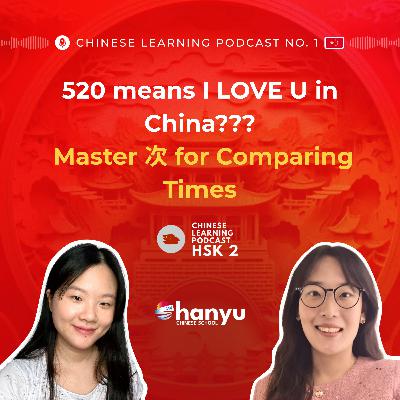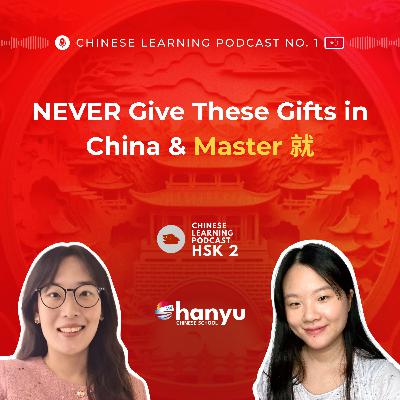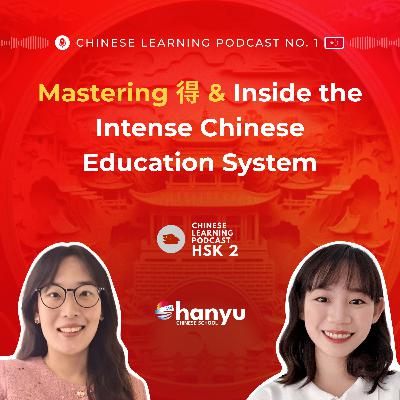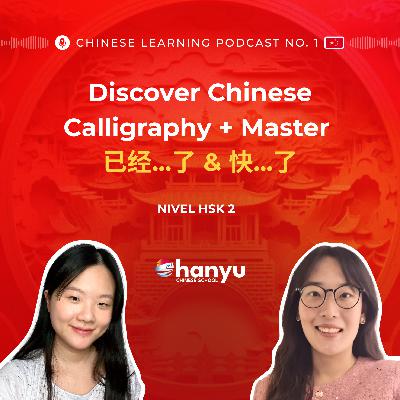Discover Chinese Learning Podcast | HSK 2
Chinese Learning Podcast | HSK 2

Chinese Learning Podcast | HSK 2
Author: Trainlang / Hanyu
Subscribed: 24Played: 112Subscribe
Share
© 2025
Description
Are you learning Chinese at an HSK 2 level?
With Hanyu Chinese School’s podcasts, you can improve your listening skills through real-life dialogues and deepen your understanding of Mandarin grammar and culture.
Practice anytime, anywhere — and take your Chinese to the next level.
Want to go further?
Join the #1 online academy for learning Mandarin: https://www.hanyuchineseschool.com/en/
With Hanyu Chinese School’s podcasts, you can improve your listening skills through real-life dialogues and deepen your understanding of Mandarin grammar and culture.
Practice anytime, anywhere — and take your Chinese to the next level.
Want to go further?
Join the #1 online academy for learning Mandarin: https://www.hanyuchineseschool.com/en/
26 Episodes
Reverse
This final episode wraps up every core HSK2 point you need for test day, with quick refreshers, natural examples, and mini drills to lock it in.
What you’ll review today:• 是…的 — emphasising details of past events• 再一次 — asking/doing something “one more time”• 看看 / 听听 / 试试 — verb reduplication for trying things out• 比 — making clear comparisons• …的时候 — talking about “when” something happens• 过 — expressing life experience (have seen/been/heard)• 多 — “more” for practice, reading, drinking, etc.
Cultural / exam segment:• HSK2 structure, timing, question types, and smart test-day tips
Mini checks (try in the comments):• Use 是…的 to highlight where/when you did something in the past• Use 比 for A vs. B comparisons• Turn a base verb into a gentle try with 看看 / 试试
Question for you:How would you say: “I had tried dumplings once, when I was in Beijing” in Chinese?Post your sentence below — we’ll check and correct it.
At Hanyu Chinese School, we take pride in offering a unique approach to language learning. What makes our school special? Here are some highlights:
Online Campus: The best virtual campus. Access study materials, interactive exercises, and additional resources from anywhere, anytime.
Private Teachers: Our highly trained teachers provide personalized classes with an individual approach.
Trial Classes: Not sure if this language is for you? Try our trial classes! Immerse yourself in the language and discover if it’s the right choice for you.
Hanyu Blog: Every week, we publish informative and entertaining articles to help you improve your understanding of the language and culture.
Learn more languages with Trainlang!
Visit our websites and start your language journey today
In this episode, Melanie and Emilyn dive into the Chinese grammar point Verb + 着, which is used to describe ongoing actions or states. You’ll learn how to use it naturally in sentences and make your Chinese sound more fluid and authentic in everyday conversations.
We also explore the fun and fascinating world of bubble tea (珍珠奶茶)! Emilyn shares insights into Taiwan’s bubble tea culture, where it’s a daily indulgence, and contrasts it with the surprising prices in Spain. Discover why this Taiwanese drink has become a global sensation and how to enjoy it like a local in Taiwan.
What You’ll Learn in This Episode: ✅ How to use Verb + 着 in Chinese sentences ✅ Real-life examples from our dialogue featuring ongoing actions ✅ Insights into Taiwan’s bubble tea culture and daily life ✅ Tips for ordering bubble tea like a local
Fun Fact: Did you know that in Taiwan, bubble tea is enjoyed almost every day? It’s so popular that there are even specialized shops where people line up for their favorite flavor combinations.
At Hanyu Chinese School, we take pride in offering a unique approach to language learning. What makes our school special? Here are some highlights:
Online Campus: The best virtual campus. Access study materials, interactive exercises, and additional resources from anywhere, anytime.
Private Teachers: Our highly trained teachers provide personalized classes with an individual approach.
Trial Classes: Not sure if this language is for you? Try our trial classes! Immerse yourself in the language and discover if it’s the right choice for you.
Hanyu Blog: Every week, we publish informative and entertaining articles to help you improve your understanding of the language and culture.
Learn more languages with Trainlang!
Visit our websites and start your language journey today
Chapters
(00:00:00) - Mandarin Podcast(00:01:49) - Hanyu Chinese School Podcast(00:02:41) - Grammar for Today(00:10:37) - Reviewing Grammar(00:13:14) - Boba Milk Tea in Taiwan vs Boba Tea in China(00:16:51) - Bubble Milk Tea(00:20:51) - How to Make a Sentence in Chinese(00:22:00) - HSK2: Time Flights
In this episode, Melanie and Vicky break down the differences between 让 (ràng), 请 (qǐng), and 叫 (jiào)—key grammar points for making polite requests, giving instructions, and issuing commands in Chinese. You’ll learn when to use each word, with practical examples from school and family settings to help you sound natural and polite in everyday conversations.
We’ll also dive into the busy lives of Chinese students, exploring how they balance schoolwork, family duties, and extracurricular activities. Discover how family expectations influence their daily routines and how these dynamics shape the typical student’s day in China.
What You’ll Learn in This Episode: ✅ How to use 让, 请, and 叫 in everyday conversations ✅ Real-life examples from our dialogue to help you understand context ✅ Insights into Chinese students’ routines and how family shapes their lives ✅ Tips on making your requests sound polite and natural
Fun Fact: In China, it’s common for students to attend extra classes, tutoring, and work on family-involved homework even on weekends. This helps explain why phrases like 让我去做作业 (let me do my homework) or 请你帮我复习 (please help me review) are so frequently heard!
Question for You: How would you say: "My mom told me to go do my Chinese homework" in Chinese? Share your sentence in the comments, and we’ll help you with corrections!
At Hanyu Chinese School, we take pride in offering a unique approach to language learning. What makes our school special? Here are some highlights:
Online Campus: The best virtual campus. Access study materials, interactive exercises, and additional resources from anywhere, anytime.
Private Teachers: Our highly trained teachers provide personalized classes with an individual approach.
Trial Classes: Not sure if this language is for you? Try our trial classes! Immerse yourself in the language and discover if it’s the right choice for you.
Hanyu Blog: Every week, we publish informative and entertaining articles to help you improve your understanding of the language and culture.
Learn more languages with Trainlang!
Visit our websites and start your language journey today
Chapters
(00:00:00) - Chinese Verbs(00:03:43) - The Dialogues(00:05:14) - Dialectic X2(00:07:20) - Basic politeness of qing, jiao and laoshi(00:10:29) - How Would You Say This in Chinese(00:11:07) - How to learn English(00:14:52) - What Chinese Students Do During School and Weekend(00:19:37) - How to Think Chinese in 2 Minutes!(00:20:48) - Chinese Students
In this episode, Vicky and Emilyn show you how to use 要、快要、就要 to talk about the near future and actions that are about to happen. Clear, real-life examples will help you sound natural when describing plans, schedules, and imminent events.
We also explore the social term 剩女 (shèngnǚ, often translated as “leftover women”) and discuss how expectations around marriage are changing. From personal choice to career focus and pop culture moments like 乘风破浪的姐姐 (Sisters Who Make Waves), we look at how modern media reflects women’s empowerment in China.
What you’ll learn in this episode ✅ How to use 要、快要、就要 in everyday conversation ✅ Easy patterns to express “about to” and “going to” ✅ The meaning and social context of 剩女 ✅ How media and culture influence expectations and personal choices
Helpful examples • 我们要开会了。 Wǒmen yào kāihuì le. We’re going to have a meeting.
• 火车快要到了。 Huǒchē kuàiyào dào le. The train is about to arrive.
• 她就要毕业了。 Tā jiù yào bìyè le. She’s just about to graduate.
Cultural note While 剩女 is sometimes used negatively, many women in China are redefining success on their own terms, prioritising independence, education, and careers. Shows like 乘风破浪的姐姐 spotlight confident role models and broader definitions of achievement.
Question for you Can you write a sentence with 要、快要 or 就要? Share it in the comments and we’ll help you improve.
At Hanyu Chinese School, we take pride in offering a unique approach to language learning. What makes our school special? Here are some highlights:
Online Campus: The best virtual campus. Access study materials, interactive exercises, and additional resources from anywhere, anytime.
Private Teachers: Our highly trained teachers provide personalized classes with an individual approach.
Trial Classes: Not sure if this language is for you? Try our trial classes! Immerse yourself in the language and discover if it’s the right choice for you.
Hanyu Blog: Every week, we publish informative and entertaining articles to help you improve your understanding of the language and culture.
Learn more languages with Trainlang!
Visit our websites and start your language journey today
Chapters
(00:00:00) - Chinese Phrases for Women in China(00:02:56) - Chinese Grammar(00:09:06) - Chinese School(00:12:15) - The Chinese word for ''(00:20:23) - Three Chinese Grammar Words
In this episode, Melanie and Emilyn guide you through the grammar points 有时候 (yǒu shíhou – sometimes) and 的时候 (de shíhou – when...), helping you talk naturally about habits, past experiences, and specific situations in Chinese.
We also explore a fun cultural topic: **Chinglish** — the quirky mix of Chinese and English that leads to hilarious signs, menus, and translations. Discover why direct translations happen, what they reveal about language and culture, and enjoy some real-life examples you won’t find in textbooks!
What You’ll Learn in This Episode: ✅ How to use 有时候 and 的时候 in real conversations ✅ Practical examples to express time and frequency ✅ The funniest Chinglish examples from daily life in China ✅ Tips to understand and navigate Chinglish while travelling or living in China
Fun Fact: Did you know that expressions like “Long time no see” and “No can do” actually come from Chinglish? They started as Chinese-style English and became part of global everyday speech!
At Hanyu Chinese School, we take pride in offering a unique approach to language learning. What makes our school special? Here are some highlights:
Online Campus: The best virtual campus. Access study materials, interactive exercises, and additional resources from anywhere, anytime.
Private Teachers: Our highly trained teachers provide personalized classes with an individual approach.
Trial Classes: Not sure if this language is for you? Try our trial classes! Immerse yourself in the language and discover if it’s the right choice for you.
Hanyu Blog: Every week, we publish informative and entertaining articles to help you improve your understanding of the language and culture.
Learn more languages with Trainlang!
Visit our websites and start your language journey today
Chapters
(00:00:00) - Chinese Grammar(00:03:36) - Chinese Shiho (action, etc.)(00:10:15) - Chinese Grammar(00:11:11) - Tea or Coffee?(00:13:22) - How do we use the Shi Hou in school?(00:14:46) - What is Chinglish in China?(00:20:48) - How to Talk in Chinese
In this episode, Vicky and Emilyn teach you how to use the grammar pattern 虽然…但是… (suīrán… dànshì… – although… but…) to express contrasts naturally in everyday Chinese. With practical examples, you’ll learn how to build smoother and more fluent sentences.
We’ll also explore the rich world of Chinese Intangible Cultural Heritage — from traditional crafts and local festivals to ancient performing arts. Discover why these traditions are treasured and how they continue to thrive in modern China.
What You’ll Learn in This Episode: ✅ How to use 虽然…但是… to express contrasting ideas ✅ Clear sentence examples you can start using today ✅ Insights into Chinese crafts, festivals, and performances ✅ Tips to improve fluency while learning grammar in context
Question for You: Can you make a sentence with 虽然…但是…? Share it in the comments below and we’ll help you improve!
At Hanyu Chinese School, we take pride in offering a unique approach to language learning. What makes our school special? Here are some highlights:
Online Campus: The best virtual campus. Access study materials, interactive exercises, and additional resources from anywhere, anytime.
Private Teachers: Our highly trained teachers provide personalized classes with an individual approach.
Trial Classes: Not sure if this language is for you? Try our trial classes! Immerse yourself in the language and discover if it’s the right choice for you.
Hanyu Blog: Every week, we publish informative and entertaining articles to help you improve your understanding of the language and culture.
Learn more languages with Trainlang!
Visit our websites and start your language journey today
In this episode, Melanie and Vicky guide you through the Chinese grammar point **一下 (yíxià)** — used to show a short action or to make requests sound more polite and softer.
We’ll also explore the trending internet slang **抽象 (chōuxiàng)**. What does it mean when young people say someone is “抽象”? Why is it so popular in memes and online chats? You’ll hear examples and jokes you won’t find in textbooks!
At Hanyu Chinese School, we take pride in offering a unique approach to language learning. What makes our school special? Here are some highlights:
Online Campus: The best virtual campus. Access study materials, interactive exercises, and additional resources from anywhere, anytime.
Private Teachers: Our highly trained teachers provide personalized classes with an individual approach.
Trial Classes: Not sure if this language is for you? Try our trial classes! Immerse yourself in the language and discover if it’s the right choice for you.
Hanyu Blog: Every week, we publish informative and entertaining articles to help you improve your understanding of the language and culture.
Learn more languages with Trainlang!
Visit our websites and start your language journey today
Chapters
(00:00:00) - Chinese Grammar 101(00:02:22) - Practicing Chinese characters in the library(00:07:15) - Chinese Dialogue(00:09:39) - High New Chinese School(00:11:20) - What is Chosian?(00:15:21) - Audience Question(00:16:06) - Learn Chinese with Isha(00:17:44) - Chinese Grammar in 60 Seconds
In this episode, we dive into the grammar of **怎么 (zěnme)** to ask “how” something is done, and how it’s used to express surprise, curiosity, and admiration in everyday Chinese. With clear examples, you’ll see how to naturally apply **怎么 + verb/adjective** in real-life situations.
We also explore the cultural phenomenon of **short dramas (微短剧 wēi duǎn jù)**—fast, engaging, mobile-first stories that are changing the entertainment industry in China.
What You’ll Learn in This Episode: ✅ How to use 怎么 + verb/adjective to ask “how” or show surprise ✅ Practical sentences to boost your Mandarin fluency ✅ The rise of short dramas in China and why they’re so popular ✅ Cultural insights into modern entertainment and social media trends
At Hanyu Chinese School, we take pride in offering a unique approach to language learning. What makes our school special? Here are some highlights:
Online Campus: The best virtual campus. Access study materials, interactive exercises, and additional resources from anywhere, anytime.
Private Teachers: Our highly trained teachers provide personalized classes with an individual approach.
Trial Classes: Not sure if this language is for you? Try our trial classes! Immerse yourself in the language and discover if it’s the right choice for you.
Hanyu Blog: Every week, we publish informative and entertaining articles to help you improve your understanding of the language and culture.
Learn more languages with Trainlang!
Visit our websites and start your language journey today
Chapters
(00:00:00) - Learning Chinese Online Podcast(00:01:49) - Today's Grammar(00:02:44) - Chinese Grammar Structure(00:07:36) - 诐 Chinese Grammar Practice(00:08:09) - Hello, How to Speak 5 Languages in a Week(00:12:01) - Culture Comment(00:12:45) - Short Drama(00:16:26) - Short Chinese Drama(00:20:58) - How to speak Chinese so well in Chinese(00:21:57) - Practice Chinese for 3 minutes(00:23:15) - Grammar of Short Drama in Chinese
In this episode, we explore resultative complements in Chinese, such as 完 (wán), 见 (jiàn), and 到 (dào). These are essential grammar tools that help you express when an action is finished, completed, or has reached a result. With clear examples, you’ll learn how to use them naturally in everyday sentences.
We also take a look at modern Chinese dating culture and the slang that comes with it. You’ll hear about terms like 渣男 (zhā nán), 渣女 (zhā nǚ), and 海王 (hǎi wáng), and discover how they reflect today’s attitudes towards relationships in China.
At Hanyu Chinese School, we take pride in offering a unique approach to language learning. What makes our school special? Here are some highlights:
Online Campus: The best virtual campus. Access study materials, interactive exercises, and additional resources from anywhere, anytime.
Private Teachers: Our highly trained teachers provide personalized classes with an individual approach.
Trial Classes: Not sure if this language is for you? Try our trial classes! Immerse yourself in the language and discover if it’s the right choice for you.
Hanyu Blog: Every week, we publish informative and entertaining articles to help you improve your understanding of the language and culture.
Learn more languages with Trainlang!
Visit our websites and start your language journey today
Chapters
(00:00:00) - Emily Nihama on NPR(00:01:09) - Chinese Grammar 101(00:02:54) - Chinese: Resultative Complementations (Mayo, Jian(00:10:34) - Literacy Grade-2,3(00:12:45) - How to learn Chinese in 2 Minutes!(00:14:13) - China's Dating Terms(00:15:10) - What is "Danan"?(00:18:07) - Chinese Dating Terms, Haiwang and Hi Ho(00:21:37) - Chinese Grammar lesson for 3rd grade students
In this episode, we explore the versatile phrase 什么都 (shénme dōu), which means “anything” or “everything”. It’s perfect for expressing unlimited choices or total flexibility in Mandarin. You’ll learn how to use 什么都 in both positive and negative sentences, with plenty of practical examples you can apply right away.
We also dive into an important cultural topic: living with parents in China. Unlike in many Western countries, it’s common for children to live with their parents until marriage. This tradition highlights the importance of family bonds, care for elders, and respect for shared responsibilities at home.
At Hanyu Chinese School, we take pride in offering a unique approach to language learning. What makes our school special? Here are some highlights:
Online Campus: The best virtual campus. Access study materials, interactive exercises, and additional resources from anywhere, anytime.
Private Teachers: Our highly trained teachers provide personalized classes with an individual approach.
Trial Classes: Not sure if this language is for you? Try our trial classes! Immerse yourself in the language and discover if it’s the right choice for you.
Hanyu Blog: Every week, we publish informative and entertaining articles to help you improve your understanding of the language and culture.
Learn more languages with Trainlang!
Visit our websites and start your language journey today!
Chapters
(00:00:00) - Chinese language(00:02:56) - How to Speak Chinese effectively with Shamatone(00:03:59) - Using Shimoto(00:08:53) - Practice Chinese Sentences in Chinese(00:09:30) - In the Elevator(00:11:33) - How do we use and learn Chinese on an Online School?(00:13:20) - Living With Parents Until Marriage in China(00:19:08) - How to Make a Sentence in Chinese(00:20:46) - Chinese Shimado
Fighting for the Bill in China | Learn Superlatives in Chinese | 最 | HSK 2 In this episode, we explore how to use 最 (zuì) to form superlatives in Mandarin. Learn how to say “the best”, “the most delicious”, or “the most interesting” with clear examples you can use in daily conversations.
We also dive into a unique cultural tradition in China: 抢账单 (qiǎng zhàngdān) — literally “fighting for the bill”. Discover why paying the bill is more than just money, and how it reflects generosity, hospitality, and respect among friends, family, and colleagues.
At Hanyu Chinese School, we take pride in offering a unique approach to language learning. What makes our school special? Here are some highlights:
Online Campus: The best virtual campus. Access study materials, interactive exercises, and additional resources from anywhere, anytime.
Private Teachers: Our highly trained teachers provide personalized classes with an individual approach.
Trial Classes: Not sure if this language is for you? Try our trial classes! Immerse yourself in the language and discover if it’s the right choice for you.
Hanyu Blog: Every week, we publish informative and entertaining articles to help you improve your understanding of the language and culture.
Learn more languages with Trainlang!
Visit our websites and start your language journey today!
Chapters
(00:00:00) - Honey Chinese Podcast(00:03:08) - Chinese Superlatives(00:10:50) - How to Become a Chinese Teacher with our Online Course(00:14:08) - 。 Fighting for the Bill in China(00:20:02) - The Most Interesting Movie I've Ever Watched In Chinese(00:20:45) - Practicing Chinese in the Elevator(00:22:38) - A Chinese Superlative
Why Chinese Use Umbrellas & The Beauty of Fair Skin | Learn Chinese with 每 (měi) In this episode, we dive into the cultural and linguistic meaning of 每 (měi) — the key word for saying “every” in Chinese. You’ll learn how to talk about habits, routines, and repeated actions in a natural and fluent way, with plenty of practical examples.
We also explore a fascinating aspect of daily life in China: why so many people use umbrellas even on sunny days. You’ll discover how fair skin is traditionally associated with beauty, status, and health, and how this cultural ideal continues to influence daily habits — including sun protection.
At Hanyu Chinese School, we take pride in offering a unique approach to language learning. What makes our school special? Here are some highlights:
Online Campus: The best virtual campus. Access study materials, interactive exercises, and additional resources from anywhere, anytime.
Private Teachers: Our highly trained teachers provide personalized classes with an individual approach.
Trial Classes: Not sure if this language is for you? Try our trial classes! Immerse yourself in the language and discover if it’s the right choice for you.
Hanyu Blog: Every week, we publish informative and entertaining articles to help you improve your understanding of the language and culture.
Learn more languages with Trainlang!
Visit our websites and start your language journey today!
Chapters
(00:00:00) - Learning Mandarin in China(00:02:08) - How to Learn Chinese in 60 Seconds(00:03:03) - Phrases in Dialogue(00:04:26) - Mei CI = Every Time (Chinese Grammar)(00:07:09) - May and Mei c in English(00:09:23) - QUESTION FOR THE DAY(00:10:01) - How to Use May in 2019(00:13:39) - Umbrellas in Chinese Culture(00:21:56) - Using may in Chinese sentences(00:24:12) - Reasons for Repeating Chinese Words in Chinese
In this episode, we explore the hidden meanings of numbers in Chinese culture — and why certain numbers appear in love messages, memes, and even marketing campaigns. You’ll learn how 520 means “I love you,” 555 means crying, and how numerology influences communication in daily life and online.
On the grammar side, we’ll focus on the measure word 次 (cì) — essential for talking about how many times something has happened or will happen. Whether you’re sharing how many times you’ve been to China or asking someone how often they visit a place, this episode gives you the tools to speak naturally and fluently.
At Hanyu Chinese School, we take pride in offering a unique approach to language learning. What makes our school special? Here are some highlights:
Online Campus: The best virtual campus. Access study materials, interactive exercises, and additional resources from anywhere, anytime.
Private Teachers: Our highly trained teachers provide personalized classes with an individual approach.
Trial Classes: Not sure if this language is for you? Try our trial classes! Immerse yourself in the language and discover if it’s the right choice for you.
Hanyu Blog: Every week, we publish informative and entertaining articles to help you improve your understanding of the language and culture.
Learn more languages with Trainlang!
Visit our websites and start your language journey today!
Chapters
(00:00:00) - Why Chinese are obsessed with numbers(00:02:34) - How many times have you been to China?(00:09:20) - C in Real Life Sentence(00:10:00) - How to travel to China by yourself in 2020(00:13:18) - Why are Chinese People SO Obsessed With Numbers?(00:19:38) - Practice Chinese sentences in 2 minutes(00:20:48) - How Many Times Something Happens in Chinese?
How to Compare in Chinese with 比 & 没有 | Is Hot Water Really a Healing Drink? | HSK 2 In this episode, we focus on two essential grammar structures for making comparisons in Chinese: 比 (bǐ) and 没有 (méiyǒu). You’ll learn how to say things like “This book is more interesting than that one” or “He’s not as tall as his brother” — all using simple, clear sentence patterns that native speakers use every day.
Then, we explore a fascinating cultural question: Why do Chinese people drink hot water so often? Is it really considered healing? We dive into this everyday habit, its roots in traditional medicine, and how it’s still part of modern life across China.
What You’ll Learn in This Episode: ✅ How to use 比 (bǐ) to say something is "more than". ✅ How to use 没有 (méiyǒu) to say something is "less than" or "not as..." ✅ Common sentence patterns for comparisons in daily life. ✅ Cultural insight: the belief in hot water as a healing remedy. ✅ Fun and practical examples to reinforce your learning
At Hanyu Chinese School, we take pride in offering a unique approach to language learning. What makes our school special? Here are some highlights:
Online Campus: The best virtual campus. Access study materials, interactive exercises, and additional resources from anywhere, anytime.
Private Teachers: Our highly trained teachers provide personalized classes with an individual approach.
Trial Classes: Not sure if this language is for you? Try our trial classes! Immerse yourself in the language and discover if it’s the right choice for you.
Hanyu Blog: Every week, we publish informative and entertaining articles to help you improve your understanding of the language and culture.
Learn more languages with Trainlang!
Visit our websites and start your language journey today!
Chapters
(00:00:00) - Comparisons in Chinese(00:02:51) - Comparing One Another's Skills(00:07:27) - Comprehension of B and Male(00:09:10) - The Mei in Chinese(00:09:51) - Comparative Sentences(00:11:43) - How to Become a Professional Student with Just €39!(00:13:07) - Chinese culture(00:19:41) - Is this book more interesting than the other one?(00:20:19) - How to make a Chinese sentence in 3 minutes!(00:21:48) - Chinese Basics
In this episode, we explore the essential word 离 (lí) — your go-to expression for talking about distance, location, and travel time in Mandarin. Whether something is very far or just around the corner, this episode helps you use 离 naturally and correctly.
We also dive into a cultural warning: why calling a woman 阿姨 (āyí) — often translated as “auntie” — might offend someone if she’s not actually your aunt. You’ll learn what to say instead, depending on age, context, and relationship.
What You’ll Learn in This Episode: ✅ How to use 离 (lí) for distance and time expressions ✅ Sentence patterns like “A 离 B 很远 / 很近” ✅ Why 阿姨 can feel inappropriate — and better alternatives ✅ Everyday examples for confident speaking ✅ A breakdown of Chinese titles and politeness rules.
Cultural Insight of the Week: In Chinese culture, 阿姨 (āyí) is age-coded. If a woman doesn’t see herself as “auntie age,” she might feel offended. Instead, use 女士 (nǚshì) in formal situations or 小姐 (xiǎojiě) in casual service contexts — but even 小姐 has limits, so use it carefully!
At Hanyu Chinese School, we take pride in offering a unique approach to language learning. What makes our school special? Here are some highlights:
Online Campus: The best virtual campus. Access study materials, interactive exercises, and additional resources from anywhere, anytime.
Private Teachers: Our highly trained teachers provide personalized classes with an individual approach.
Trial Classes: Not sure if this language is for you? Try our trial classes! Immerse yourself in the language and discover if it’s the right choice for you.
Hanyu Blog: Every week, we publish informative and entertaining articles to help you improve your understanding of the language and culture.
Learn more languages with Trainlang!
Visit our websites and start your language journey today!
Chapters
(00:00:00) - Chinese Language Master Class Podcast(00:02:27) - Chinese language(00:08:55) - How to commute to work in China(00:12:50) - How Chinese people address each other in Chinese(00:16:16) - What Is I? ((00:17:38) - "Big Brother" and "Little Sister"(00:19:01) - "Shauguko" and "Tick Tock"(00:22:54) - Chinese people's use of I in conversation(00:25:17) - Chinese Language(00:26:47) - Chinese Phrases in 2 Minutes
In this episode, we break down the versatile Chinese word 就 (jiù) and how it’s used to express “already,” “soon,” or “as early as.” You’ll learn how native speakers use 就 in daily conversations to sound natural and fluent — plus the cultural nuances behind it.
We also explore Chinese gift-giving taboos — from why you should never give an umbrella or a clock, to what gifts bring good luck. Discover how these traditions are evolving in modern China, and how to avoid embarrassing mistakes when giving gifts to Chinese friends or colleagues.
What You’ll Learn in This Episode: ✅ How to use 就 (jiù) to express “already,” “soon,” or “as early as” ✅ Cultural taboos in gift-giving and what NOT to give ✅ Practical sentence examples with 就 ✅ Fascinating insights into modern vs. traditional Chinese etiquette.
At Hanyu Chinese School, we take pride in offering a unique approach to language learning. What makes our school special? Here are some highlights:
Online Campus: The best virtual campus. Access study materials, interactive exercises, and additional resources from anywhere, anytime.
Private Teachers: Our highly trained teachers provide personalized classes with an individual approach.
Trial Classes: Not sure if this language is for you? Try our trial classes! Immerse yourself in the language and discover if it’s the right choice for you.
Hanyu Blog: Every week, we publish informative and entertaining articles to help you improve your understanding of the language and culture.
Learn more languages with Trainlang!
Visit our websites and start your language journey today!
Chapters
(00:00:00) - Hanyu Chinese School Podcast(00:02:30) - Ethical Grammar(00:06:16) - When it means Already(00:09:39) - How to Speak Chinese in 2 Minutes!(00:11:56) - Reviewing the Dual Grammar(00:13:45) - 13 Chinese Gift Gifts You Should Never Give(00:19:28) - How to Do Your Homework in Chinese(00:20:45) - Fluent Chinese Words for Future and Present
Unlock China’s Education Secrets | Master 得 in Chinese | HSK 2 Ever wondered how the Chinese education system works? In this episode, we explore the intense and fascinating world of China’s Gāokǎo exam (the National College Entrance Exam) and the cultural importance of education. Plus, we’ll teach you the grammar behind the structure 得 (de), which is used to describe how well you can do something or the extent to which something is done
What You’ll Learn Today: ✔️ Grammar: How to use 得 (de) for describing how well you do something in Chinese. ✔️ Culture: The importance of Gāokǎo and the impact of China’s intense education culture on students’ lives. ✔️ Vocab: Key Chinese education terms like 学得 (xué de) and 考试 (kǎoshì) to talk about learning and exams. ✔️ Bonus: Why Chinese students face such pressure and how it shapes their future.
At Hanyu Chinese School, we take pride in offering a unique approach to language learning. What makes our school special? Here are some highlights:
Online Campus: The best virtual campus. Access study materials, interactive exercises, and additional resources from anywhere, anytime.
Private Teachers: Our highly trained teachers provide personalized classes with an individual approach.
Trial Classes: Not sure if this language is for you? Try our trial classes! Immerse yourself in the language and discover if it’s the right choice for you.
Hanyu Blog: Every week, we publish informative and entertaining articles to help you improve your understanding of the language and culture.
Learn more languages with Trainlang!
Visit our websites and start your language journey today!
Master 想, 要, 不想, 不要 | Expressing Desires & Career Choices in China In this episode, we explore four essential verbs in Chinese: 想 (xiǎng), 要 (yào), 不想 (bùxiǎng), and 不要 (bùyào). These structures are key to expressing what you want (or don’t want), your intentions, and even how to politely refuse something. You'll also discover the cultural reality behind career choices in China—where the Gaokao, family expectations, and social pressure often shape a student’s future more than personal dreams.
What You’ll Learn in This Episode: ✅ How to express wants, intentions, and refusals using 想, 要, 不想, and 不要 ✅ The difference between 想 (soft desire) and 要 (strong intention) ✅ How family and society influence career paths in China ✅ Real-life examples to speak more naturally and fluently
At Hanyu Chinese School, we take pride in offering a unique approach to language learning. What makes our school special? Here are some highlights:
Online Campus: The best virtual campus. Access study materials, interactive exercises, and additional resources from anywhere, anytime.
Private Teachers: Our highly trained teachers provide personalized classes with an individual approach.
Trial Classes: Not sure if this language is for you? Try our trial classes! Immerse yourself in the language and discover if it’s the right choice for you.
Hanyu Blog: Every week, we publish informative and entertaining articles to help you improve your understanding of the language and culture.
Learn more languages with Trainlang!
Visit our websites and start your language journey today!
Master 已经...了 & 快...了 | The Art of Chinese Calligraphy & Grammar Tips In this episode, we explore two essential Chinese grammar structures: ✅ 已经...了 (yǐjīng...le) – to express completed actions ✅ 快...了 (kuài...le) – to talk about events happening soon Learn to use them naturally in daily conversations to sound fluent and confident.
We also dive into the fascinating world of Chinese calligraphy (书法, shūfǎ) — not just beautiful writing, but an ancient art form that expresses personality, philosophy, and cultural depth. Discover why it’s so respected in Chinese society and how it continues to influence daily life.
At Hanyu Chinese School, we take pride in offering a unique approach to language learning. What makes our school special? Here are some highlights:
Online Campus: The best virtual campus. Access study materials, interactive exercises, and additional resources from anywhere, anytime.
Private Teachers: Our highly trained teachers provide personalized classes with an individual approach.
Trial Classes: Not sure if this language is for you? Try our trial classes! Immerse yourself in the language and discover if it’s the right choice for you.
Hanyu Blog: Every week, we publish informative and entertaining articles to help you improve your understanding of the language and culture.
Learn more languages with Trainlang!
Visit our websites and start your language journey today!
Master 真 (zhēn): Saying “Really” in Chinese + What Family Truly Means in Chinese Culture In this episode, we break down the powerful and expressive word 真 (zhēn) — used to mean “really,” “truly,” or to add emphasis in Mandarin. Learn how to sound more natural when showing admiration, confirming facts, or reacting with surprise.
We also explore the central role of family in Chinese society, where concepts like filial piety (孝顺 xiàoshùn) and multi-generational households deeply influence everyday life, relationships, and decision-making. In this episode, you’ll learn: ✅ How to use 真 (zhēn) naturally in everyday speech ✅ Ways to express admiration, confirmation, or surprise ✅ Why family is a core value in Chinese culture ✅ Practical phrases to boost your Mandarin fluency
At Hanyu Chinese School, we take pride in offering a unique approach to language learning. What makes our school special? Here are some highlights:
Online Campus: The best virtual campus. Access study materials, interactive exercises, and additional resources from anywhere, anytime.
Private Teachers: Our highly trained teachers provide personalized classes with an individual approach.
Trial Classes: Not sure if this language is for you? Try our trial classes! Immerse yourself in the language and discover if it’s the right choice for you.
Hanyu Blog: Every week, we publish informative and entertaining articles to help you improve your understanding of the language and culture.
Learn more languages with Trainlang!
Visit our websites and start your language journey today!










